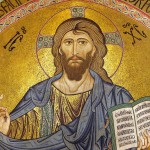“Where would we go? You have the words of eternal life.”
Peter’s words here are the words of a desperate lover, which is definitely what he was. Peter almost never understood Jesus, at least until Easter, but he knew he loved him, and that was enough for him.
That’s what we need to do. Hold on to love. Desperately. Like a life preserver in the storm. Nothing else saves, everything else is straw.
My former boss Elizabeth Scalia has asked a bunch of internet Catholics why, amidst the current decline in Catholic affiliation, we still remain Catholic. And my first instinct was to write something smug and trolly, like “Because it is the one true Church, founded by and in Christ, God made man, and indwelled by the Spirit to lead his people into all truth.” And, sure enough, I’m convinced that’s true.
But I come back to Peter. Where else would I go?
Peter is responding to Jesus’s Bread of Life discourse, perhaps the most shocking part of his ministry. Jesus embraced his Jewish identity even as he seemingly delighted in offending the Jewish sensibilities of his day. What could be more offensive to a Torah-shaped mind, a Torah observance-shaped worldview, than saying you must eat my flesh and drink my blood to be part of the world to come? After the Maccabean martyrs had died refusing to eat pork, died praying the Shema, died expecting the life of the age to come because they had refused to break Torah? What could be more offensive than comparing his very flesh and blood to the manna? And the text makes it quite clear that he meant these things literally.
Peter doesn’t know what to make of that. But he knows that he loves, desperately, and he clings to that. That is the only true wisdom.
Every conversion story is different, and every conversion story is the same. Nothing is more extraordinary when experienced from the inside. But it can be very mundane viewed from the outside.
I had an utterly boring trajectory from childhood faith to adolescent questioning. I never seriously contemplated atheism—it has always seemed self-evident to me that there is a Beyond, a Meaning, an Absolute Reality on which all contingent reality is based, a transcendent source of all truth, goodness and beauty, even when it seemed less likely than not that this Source was a personal God. I did contemplate Lutheranism (which is much worse), and Taoism, and a hodgepodge of Neoplatonism and Stoicism.
What kept me hooked to the Church was not philosophy, or theology, or Biblical scholarship, or agreement with the doctrines of the Church (I remember a vigorous argument with a priest about justification by faith alone; and as a hormone-filled teenager, the less said about my views on Christian sexual ethics the better). What kept me hooked, like an elastic rope tied around my waist, dragging me back whenever I wandered past the borders of the Church, was the Eucharist. The Bread of Life.
To this day, I cannot explain it, but if there is one thing, as far as I can remember (and I was too young to remember First Communion), that I have always believed, it is the doctrine of the Real Presence. Believe is too weak a word. Even “know” seems like too weak a word. For me it is simply the most obvious thing in the world. I can’t tell you why, or how. But it is the thing I am more certain of than anything else—that the eucharistic bread and wine truly and really are the body, blood, soul and divinity of Jesus Christ, the Son of God.
I wish I could tell you there was some moment, some mystical experience perhaps, that anchored that belief in me. I wish I could tell you “I believe in the Real Presence because…” But no, I just do.
I think it’s healthy to question your beliefs, and I think the process that I went through, and I suppose most cradle believers go through, in adolescence, is healthy. But this one I was unable to question, and still am. Not because I didn’t want to. But because it seemed impossible. Far easier for me, the philosophy nerd, to question whether anything exists at all.
And so the Eucharist became my “cogito”, the one bedrock belief on which everything else can be then built. I could stop believing in God, or at least I felt like sometimes I might be able to, but I could not stop believing in the Eucharist (it’s amazing how easy it is to hold contradictory beliefs in your mind). I just couldn’t.
And so at some point I had to take a step back and realize that if the Eucharist really is the body and blood of Jesus, then Jesus’ claims about himself must be true; then the Church that gives me this Eucharist must be, well, the Church.
And so I accepted, not to do a 180 on my disagreements with the Magisterium, but at least to put them on hold, to at least make a bet that I might be wrong, and that there might be something, well, divine about the teachings of a Church that can give me a divine bread. Actually believing the teachings of the Church took me many years, and most days I am not sure the process is complete. (How about living them? Ha!)
And to this day, the Eucharist remains my only, my most basic belief. Everything else I believe, I believe because of this. And I still cannot explain why or how that is. I can only report the fact.
In the meantime, well, where else could I go? The Word became flesh and dwelt among us, and we beheld his glory.











